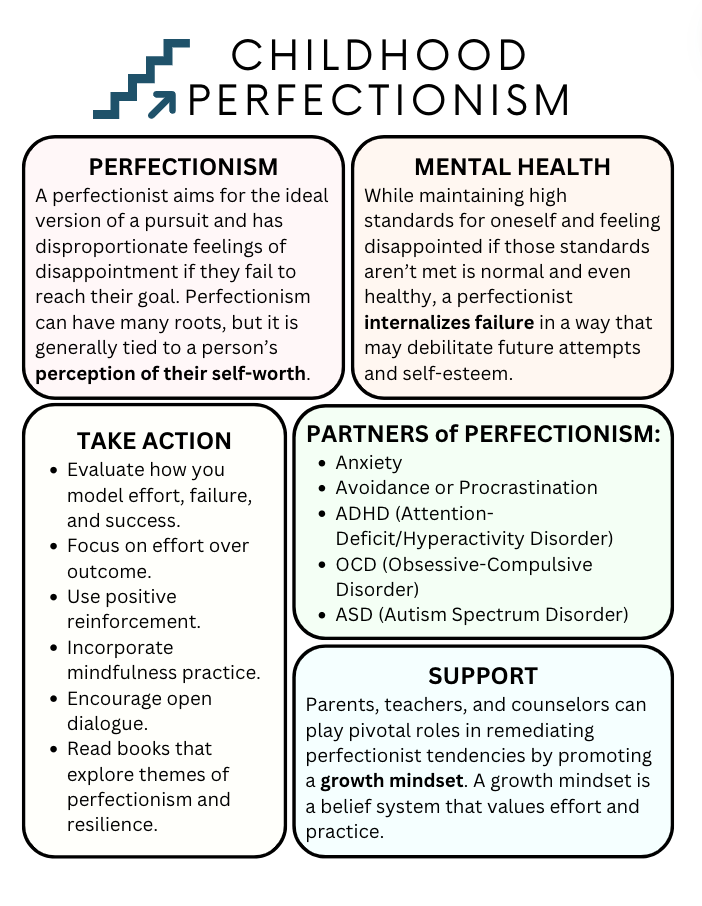Childhood Perfectionism
What it is & How to Help
The Perfectionist Child
A perfectionist aims for the ideal version of a pursuit and has disproportionate feelings of disappointment if they fail to reach their goal. Perfectionism can have many roots, but it is generally tied to a person’s perception of their self-worth.
While maintaining high standards for oneself and feeling disappointed if those standards aren’t met is normal and even healthy, a perfectionist internalizes failure in a way that may debilitate future attempts and self-esteem.
Perfectionism is often accompanied by a fixed mindset—a belief system that discounts effort and practice. Children with a fixed mindset might give up easily, avoid challenges, and have a fear of failure.
Partners with Perfectionism
Anxiety: “During the past decade, research has shown that perfectionism is associated with greater anxiety symptoms, greater severity of disorders, and poor treatment response for childhood anxiety disorders” (APA PsycNet, n.d.).
Avoidance or Procrastination: “The present study provides evidence that perfectionism and procrastination can only be linked by the negative characteristics they share through fear of failure, temporal orientation, external stimulation, and negative emotional aspects, such as depression, stress, and anxiety” (Sederlund et al., 2020).
ADHD (Attention-Deficit/Hyperactivity Disorder): “For the young person who has ADHD, perfectionism has another characteristic: Many attempt to use it as a way to mitigate their ADHD symptoms and avoid disappointing the adults in their lives” (Perfectionism and ADHD Can Become Unhealthy for Children - CHADD, 2024).
OCD (Obsessive-Compulsive Disorder): “Studying young children, researchers at Washington University School of Medicine in St. Louis found that kids who possess tendencies toward perfectionism and excessive self-control are twice as likely as other children to develop obsessive-compulsive disorder (OCD) by the time they reach their teens” (Dryden, 2018).
ASD (Autism Spectrum Disorder): Attentional strength is a common characteristic in individuals with ASD and “autistic adults report both advantages and problems [with attentional strength], linking attention to detail with difficulty switching tasks and perfectionism” (Dupuis et al., 2022).
How to Support a Perfectionist
Parents, teachers, and counselors can play pivotal roles in remediating perfectionist tendencies by promoting a growth mindset. A growth mindset is a belief system that values effort and practice. Children with a growth mindset are intrinsically motivated, embrace challenges, and learn from failures.
Take Action!
Adults should evaluate how they model effort, failure, and success:
Research by Carmo et al. (2021) found that “according to Social Learning Model, children may imitate parents’ perfectionism behaviors through a modeling process.” They also noted that “ the development of perfectionism involves other factors, such as sociocultural environment, peer and significant other (e.g., teachers, coaches) interactions as well as factors inherent to the child (e.g., temperament)” (Carmo et al., 2021).
Focus on effort over outcome:
When kids focus on the process rather than the end result, they learn that setbacks are part of learning and growth. This mindset encourages them to take on challenges, develop problem-solving skills, and build confidence in their abilities. By placing the value on effort, hard work and determination are highlighted as the true measures of success.
Use positive reinforcement:
By praising and rewarding effort (versus punishing failure), kids learn the value of hard work and persistence. This approach builds self-esteem, motivation, and a sense of competence as children recognize the connection between their actions and positive outcomes.
Incorporate mindfulness practice:
A major component of mindfulness practice is gratitude. Encouraging kids to express gratitude helps them to develop a positive mindset and buffers them against adversity and perfectionist tendencies. A habit of gratitude contributes to a resilient foundation for facing life's inevitable ups and downs. Learn how to incorporate mindfulness into daily practice with our mindfulness activities and picture books about mindfulness!
Encourage open dialogue:
Encourage children to express their thoughts, feelings, and concerns, and attend to their expression with empathy. By actively listening without judgment, adults create an environment where children feel comfortable sharing their experiences, and grownups are able to address issues, offer guidance, and provide support in a collaborative manner. Explore our conversation starters for ideas to help children develop effective communication skills.
Read books that explore themes of perfectionism and resilience:
Bibliotherapy is a therapeutic approach that utilizes literature as a means to address and alleviate emotional, behavioral, psychological, and social challenges. Storytelling allows kids to explore the difficulties of perfectionism from a safe space within the pages of a book where they can: see their emotions mirrored and learn emotional articulation; step into the shoes of different characters to gain insights into various perspectives; learn applicable problem-solving skills; observe and internalize the ability to persevere in the face of adversity; and gain an appreciation of human diversity.
Children’s Books About Perfectionism
Our collection of books about perfectionism aims to create a safe and supportive space for kids to explore and understand the pressures of perfectionism. Through stories, children can develop a healthy mindset towards challenges and setbacks, while reinforcing themes of self-acceptance, resilience, and the beauty of embracing imperfections.
It’s Not All Rainbows
A book that highlights: perfectionism & resilience.
“A unicorn's bad day turns into a laugh-out-loud look at the pressure to be perfect and the importance of expressing your feelings
Everyone knows that unicorns are perfect. They are glamorous and glittery, and their smiles make rainbows appear! But Kevin is having a less-than-perfect day. First, he wakes up on the wrong side of the bed ...on the floor. Then he discovers that his mane is so wild that even his Super-Perfect-Hair-Day-Spray can't tame it. And the day just gets worse from there. Kevin does his best to keep his outlook sunny, but it's hard to keep smiling when everything goes horribly wrong!”
The Brand-New, Never-Used, Perfect Crayons
A book that highlights: perfectionism & resilience.
“Violet is ecstatic when she earns her very own super big box of eighty-four crayons all matching in length, perfectly pointed, each in their smooth, uniform wrapper. There’s even one with her name on it. She can’t stop imagining all the wonderful things she can draw with them.
But when it comes time to get busy, she can’t seem to do it—she doesn’t want to ruin all that perfection. It isn’t until her little sister takes matters into her own hands that Violet is able to let go and have fun drawing all the things she dreamed up when she first got her box of brand-new, never-used, perfect crayons.
Author Leanne Hatch taps into the joy of sharing, creating, and letting go of perfectionism.”
Trying
A book that highlights: perfectionism, perseverance, & resilience.
“This is a story for anyone who has ever felt like a beginner, or had doubts, or worried they weren't good enough. It's a story for those who have experienced the pain of trying something new and not having it turn out as they had hoped.
Written by New York Times best-selling author Kobi Yamada, this captivating book celebrates the way failure is the just the beginning of the journey. With alluring black-and-white illustrations and a powerful message, this beautiful tale is about how failure has so much to offer--lessons that help us learn, grow, and discover all the amazing things we can do.”
The Book of Mistakes
A book that highlights: perfectionism, optimism, & resilience.
“As one artist incorporates accidental splotches, spots, and misshapen things into her art, she transforms her piece in quirky and unexpected ways, taking readers on a journey through her process. Told in minimal, playful text, this story shows readers that even the biggest “mistakes” can be the source of the brightest ideas—and that, at the end of the day, we are all works in progress, too.”
The Pumpernickel-Daffodil
A book that highlights: perfectionism, friendship, & acceptance.
“Wodehouse Chili Pepper Pumpernickel the Third has an important family: His mother is the famous Mathilda Lily-Rose Daffodil, and his father is the celebrated Wodehouse Chili Pepper Pumpernickel the Second. It’s a family of champions, blue-ribbon winners, and Bests in Show galore, and all of them agree that one day, he will be the best of them all! After all, he IS a Pumpernickel-Daffodil. But when he gets his own human, neither feels so sure that they’re blue-ribbon material, and they both wonder if they’ll be top dog at their first competition. . .
From acclaimed author-illustrator Galia Bernstein comes a charming and hilarious story that celebrates kindred spirits and forging your own path.”
The Power of Yeti
A book that highlights: perfectionism, confidence, resilience, & a growth mindset.
“Some days it seems like everybody is bigger, stronger, and faster than you, and that has one little boy feeling blue. Fortunately, a surprising someone steps in to help--a big, hairy Yeti--along with some very impressive relatives: Bigfoot, Sasquatch, and the Abominable Snow Monster! But it is Yeti who claims to be the most powerful one in his family, all because of . . . the POWER OF YETI! This is the power that comes with knowing you can succeed, but it will take time and effort. And thanks to Yeti’s words of encouragement, the boy starts looking at things in a new light. He doesn't know how to tie his shoelaces . . . YETi! And he's not great at making soccer goals . . . YETi! He might not be the biggest, strongest, or fastest kid on the playground, but it turns out he's still pretty powerful and full of potential--all because of the power of YETi.”
Mr. Thatcher’s House
A book that highlights: perfectionism, resilience, & friendship.
“Mr. Thatcher has been working to build the perfect house. And working. And working . . . and so, quite by accident, the house grows and grows in size. But it never seems quite like home. When a crowd of characters from his storybook neighborhood show up looking for a place to stay, Mr. Thatcher cries "It's not perfect yet! You don't want to stay here!" But soon he finds that what makes a house a perfect home has nothing to do with the craftsmanship and everything to do with the friends and family inside it.”
A free printable version of this information is available in our Infographics Tab!
CLICK HERE to explore our pediatric mental and behavioral health infographics.
REFERENCES
APA PsycNet. (n.d.). https://psycnet.apa.org/record/2017-21407-006
Carmo, C., Oliveira, D. F., Brás, M., & Faísca, L. (2021). The influence of parental perfectionism and parenting styles on child perfectionism. Children (Basel), 8(9), 777. https://doi.org/10.3390/children8090777
Dryden, J. (2018, December 27). Perfectionism in young children may indicate OCD risk | Washington University School of Medicine in St. Louis. Washington University School of Medicine in St. Louis. https://medicine.wustl.edu/news/perfectionism-in-young-children-may-indicate-ocd-risk/
Dupuis, A., Mudiyanselage, P., Burton, C. L., Arnold, P., Crosbie, J., & Schachar, R. (2022). Hyperfocus or flow? Attentional strengths in autism spectrum disorder. Frontiers in Psychiatry, 13. https://doi.org/10.3389/fpsyt.2022.886692
Perfectionism and ADHD can become unhealthy for children - CHADD. (2024, February 9). CHADD. https://chadd.org/adhd-news/adhd-news-caregivers/perfectionism-and-adhd-can-become-unhealthy-for-children/
Sederlund, A. P., Burns, L., & Rogers, W. M. (2020). Multidimensional models of perfectionism and procrastination: seeking determinants of both. International Journal of Environmental Research and Public Health, 17(14), 5099. https://doi.org/10.3390/ijerph17145099









